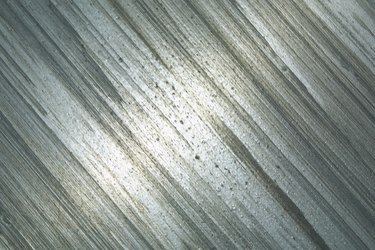Things You'll Need
Vinegar
Soft cleaning cloth
Bakinig soda, optional
Water, optional

Sheets of stainless steel can be used in a variety of ways, most times for building and construction purposes. The sheets can be used for anything from a kitchen back splash, to a design covering an entire wall. The elegant look of the steel, combined with the superior durability of the product makes it the perfect element for use on a home interior. Cleaning the stainless steel sheets is required from time to time, to keep the polished appearance of the steel looking its best.
Step 1
Moisten a soft cleaning cloth with white vinegar, using just enough to make the cloth damp, but not soaked and dripping with vinegar. The vinegar will clean and disinfect the sheets without damaging the steel surface.
Video of the Day
Step 2
Wipe the damp cloth over the sheets of stainless steel using long, steady strokes. This will provide a more even cleaning, plus eliminate streaks and smudges.
Step 3
Repeat until the entire sheet has been cleaned, then wipe once more with a clean, dry soft cloth. This will absorb any leftover vinegar solution, leaving the stainless steel gleaming and flawless.
Step 4
Sprinkle a thick coating of baking soda over any stained areas that are not easily removed with the vinegar solution.
Step 5
Dampen a cleaning cloth, then rub the baking soda into the stainless steel sheet.
Step 6
Scrub in small circular motions, then wipe clean with a damp cloth. Repeat until the entire stain has been removed.
Step 7
Clean once more with the vinegar solution, again wiping in long, even strokes to prevent streaking or spots.
Step 8
Wipe clean with a dry cloth.
Warning
Never soak stainless steel in water, or allow it to be in contact with water for an extended period of time, which can cause corrosion.
Video of the Day